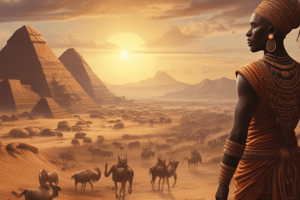Podcast
Questions and Answers
In which century CE did the Axum Empire adopt Christianity?
In which century CE did the Axum Empire adopt Christianity?
- 4th century (correct)
- 2nd century
- 3rd century
- 1st century
Which African empire was founded by Sundiata Keita in the 13th century CE?
Which African empire was founded by Sundiata Keita in the 13th century CE?
- Mali Empire (correct)
- Songhai Empire
- Ghana Empire
- Oyo Empire
What was a significant consequence of the Transatlantic Slave Trade in Africa?
What was a significant consequence of the Transatlantic Slave Trade in Africa?
- Cultural exchange and enrichment
- Devastating impact on African societies and economies (correct)
- Economic growth and development
- Increased European investment in Africa
Which African kingdom was known for its powerful rulers and cavalry-based armies?
Which African kingdom was known for its powerful rulers and cavalry-based armies?
What was the primary goal of the Berlin Conference of 1884-85?
What was the primary goal of the Berlin Conference of 1884-85?
Who was a key figure in the African nationalist movement?
Who was a key figure in the African nationalist movement?
In which century CE did the majority of African countries gain independence?
In which century CE did the majority of African countries gain independence?
Which ancient African civilization was known for its pyramids and powerful queens?
Which ancient African civilization was known for its pyramids and powerful queens?
Flashcards are hidden until you start studying
Study Notes
Ancient Africa (3000 BCE - 500 CE)
- Ancient Egypt:
- Established around 3100 BCE
- Known for pyramids, mummification, and hieroglyphics
- Major rulers: Ramses II, Hatshepsut, and Thutmose III
- Nubia:
- Located in modern-day Sudan
- Known for pyramids and powerful queens (e.g., Amanirenas)
- Influenced by Egyptian culture
- Axum Empire:
- Located in modern-day Ethiopia and Eritrea
- Known for its powerful kingdom and trade networks
- Adopted Christianity in the 4th century CE
Medieval Africa (500 - 1500 CE)
- Ghana Empire:
- Located in modern-day Mali and Senegal
- Known for its rich gold trade and Islamic influence
- Founded around the 4th century CE
- Mali Empire:
- Founded by Sundiata Keita in the 13th century CE
- Known for its powerful rulers (e.g., Mansa Musa) and Islamic scholarship
- Controlled the trans-Saharan trade
- Swahili City-States:
- Located along the East African coast
- Known for their Islamic culture and trade networks
- Flourished from the 10th to the 16th century CE
Early Modern Africa (1500 - 1800 CE)
- Transatlantic Slave Trade:
- Millions of Africans forcibly enslaved and transported to the Americas
- Lasted from the 15th to the 19th century CE
- Devastating impact on African societies and economies
- Oyo Empire:
- Located in modern-day Nigeria
- Known for its powerful rulers and cavalry-based armies
- Flourished from the 14th to the 19th century CE
- Zulu Kingdom:
- Located in modern-day South Africa
- Known for its powerful rulers (e.g., Shaka Zulu) and military conquests
- Flourished from the 18th to the 19th century CE
Modern Africa (1800 - 2000 CE)
- Scramble for Africa:
- European colonization of Africa from the late 19th century CE
- Leading to the Partition of Africa and the Berlin Conference (1884-85)
- Resulted in the exploitation and oppression of African peoples
- Nationalist Movements:
- Emerged in the early 20th century CE
- Fought for independence from European colonial powers
- Key figures: Kwame Nkrumah, Julius Nyerere, and Nelson Mandela
- African Independence:
- Most African countries gained independence in the mid-20th century CE
- Challenges: neocolonialism, corruption, and economic inequality
Ancient Africa (3000 BCE - 500 CE)
- Ancient Egypt:
- Established around 3100 BCE
- Developed pyramids, mummification, and hieroglyphics
- Notable rulers: Ramses II, Hatshepsut, and Thutmose III
- Nubia:
- Located in modern-day Sudan
- Characterized by pyramids and powerful queens (e.g., Amanirenas)
- Strongly influenced by Egyptian culture
- Axum Empire:
- Located in modern-day Ethiopia and Eritrea
- Known for its powerful kingdom and extensive trade networks
- Adopted Christianity in the 4th century CE
Medieval Africa (500 - 1500 CE)
- Ghana Empire:
- Located in modern-day Mali and Senegal
- Flourished due to its rich gold trade and Islamic influence
- Founded around the 4th century CE
- Mali Empire:
- Founded by Sundiata Keita in the 13th century CE
- Notable for its powerful rulers (e.g., Mansa Musa) and Islamic scholarship
- Controlled the trans-Saharan trade
- Swahili City-States:
- Located along the East African coast
- Characterized by Islamic culture and trade networks
- Flourished from the 10th to the 16th century CE
Early Modern Africa (1500 - 1800 CE)
- Transatlantic Slave Trade:
- Forced enslavement and transportation of millions of Africans to the Americas
- Lasted from the 15th to the 19th century CE
- Devastating impact on African societies and economies
- Oyo Empire:
- Located in modern-day Nigeria
- Notable for its powerful rulers and cavalry-based armies
- Flourished from the 14th to the 19th century CE
- Zulu Kingdom:
- Located in modern-day South Africa
- Characterized by powerful rulers (e.g., Shaka Zulu) and military conquests
- Flourished from the 18th to the 19th century CE
Modern Africa (1800 - 2000 CE)
- Scramble for Africa:
- European colonization of Africa from the late 19th century CE
- Led to the Partition of Africa and the Berlin Conference (1884-85)
- Resulted in the exploitation and oppression of African peoples
- Nationalist Movements:
- Emerged in the early 20th century CE
- Fought for independence from European colonial powers
- Key figures: Kwame Nkrumah, Julius Nyerere, and Nelson Mandela
- African Independence:
- Most African countries gained independence in the mid-20th century CE
- Challenges: neocolonialism, corruption, and economic inequality
Studying That Suits You
Use AI to generate personalized quizzes and flashcards to suit your learning preferences.




